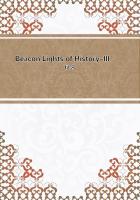In the land of Purgation the air is freer,and the holy mountain rises into the pure light of day.There is peace for us,and for those who for a season abide in it there is some peace also,though,pale from the poison of the Maremma,Madonna Pia passes before us,and Ismene,with the sorrow of earth still lingering about her,is there.Soul after soul makes us share in some repentance or some joy.He whom the mourning of his widow taught to drink the sweet wormwood of pain,tells us of Nella praying in her lonely bed,and we learn from the mouth of Buonconte how a single tear may save a dying sinner from the fiend.Sordello,that noble and disdainful Lombard,eyes us from afar like a couchant lion.When he learns that Virgil is one of Mantua's citizens,he falls upon his neck,and when he learns that he is the singer of Rome he falls before his feet.In that valley whose grass and flowers are fairer than cleft emerald and Indian wood,and brighter than scarlet and silver,they are singing who in the world were kings;but the lips of Rudolph of Hapsburg do not move to the music of the others,and Philip of France beats his breast and Henry of England sits alone.On and on we go,climbing the marvellous stair,and the stars become larger than their wont,and the song of the kings grows faint,and at length we reach the seven trees of gold and the garden of the Earthly Paradise.In a griffin-drawn chariot appears one whose brows are bound with olive,who is veiled in white,and mantled in green,and robed in a vesture that is coloured like live fire.The ancient flame wakes within us.Our blood quickens through terrible pulses.We recognise her.It is Beatrice,the woman we have worshipped.The ice congealed about our heart melts.Wild tears of anguish break from us,and we bow our forehead to the ground,for we know that we have sinned.When we have done penance,and are purified,and have drunk of the fountain of Lethe and bathed in the fountain of Eunoe,the mistress of our soul raises us to the Paradise of Heaven.Out of that eternal pearl,the moon,the face of Piccarda Donati leans to us.
Her beauty troubles us for a moment,and when,like a thing that falls through water,she passes away,we gaze after her with wistful eyes.The sweet planet of Venus is full of lovers.
Cunizza,the sister of Ezzelin,the lady of Sordello's heart,is there,and Folco,the passionate singer of Provence,who in sorrow for Azalais forsook the world,and the Canaanitish harlot whose soul was the first that Christ redeemed.Joachim of Flora stands in the sun,and,in the sun,Aquinas recounts the story of St.
Francis and Bonaventure the story of St.Dominic.Through the burning rubies of Mars,Cacciaguida approaches.He tells us of the arrow that is shot from the bow of exile,and how salt tastes the bread of another,and how steep are the stairs in the house of a stranger.In Saturn the soul sings not,and even she who guides us dare not smile.On a ladder of gold the flames rise and fall.At last,we see the pageant of the Mystical Rose.Beatrice fixes her eyes upon the face of God to turn them not again.The beatific vision is granted to us;we know the Love that moves the sun and all the stars.
Yes,we can put the earth back six hundred courses and make ourselves one with the great Florentine,kneel at the same altar with him,and share his rapture and his scorn.And if we grow tired of an antique time,and desire to realise our own age in all its weariness and sin,are there not books that can make us live more in one single hour than life can make us live in a score of shameful years?Close to your hand lies a little volume,bound in some Nile-green skin that has been powdered with gilded nenuphars and smoothed with hard ivory.It is the book that Gautier loved,it is Baudelaire's masterpiece.Open it at that sad madrigal that begins Que m'importe que tu sois sage?
Sois belle!et sois triste!and you will find yourself worshipping sorrow as you have never worshipped joy.Pass on to the poem on the man who tortures himself,let its subtle music steal into your brain and colour your thoughts,and you will become for a moment what he was who wrote it;nay,not for a moment only,but for many barren moonlit nights and sunless sterile days will a despair that is not your own make its dwelling within you,and the misery of another gnaw your heart away.Read the whole book,suffer it to tell even one of its secrets to your soul,and your soul will grow eager to know more,and will feed upon poisonous honey,and seek to repent of strange crimes of which it is guiltless,and to make atonement for terrible pleasures that it has never known.And then,when you are tired of these flowers of evil,turn to the flowers that grow in the garden of Perdita,and in their dew-drenched chalices cool your fevered brow,and let their loveliness heal and restore your soul;or wake from his forgotten tomb the sweet Syrian,Meleager,and bid the lover of Heliodore make you music,for he too has flowers in his song,red pomegranate blossoms,and irises that smell of myrrh,ringed daffodils and dark blue hyacinths,and marjoram and crinkled ox-eyes.Dear to him was the perfume of the bean-field at evening,and dear to him the odorous eared-spikenard that grew on the Syrian hills,and the fresh green thyme,the wine-cup's charm.The feet of his love as she walked in the garden were like lilies set upon lilies.Softer than sleep-laden poppy petals were her lips,softer than violets and as scented.The flame-like crocus sprang from the grass to look at her.For her the slim narcissus stored the cool rain;and for her the anemones forgot the Sicilian winds that wooed them.And neither crocus,nor anemone,nor narcissus was as fair as she was.














